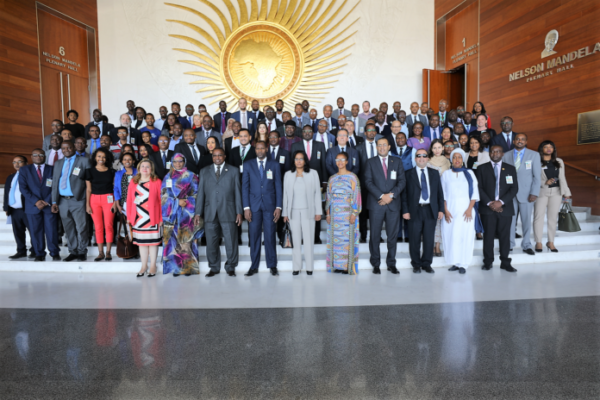On the sidelines of the African Week of Industrialization, which began on November 19 in Addis Ababa under the aegis of the Trade and Industry Department of the African Union Commission, the Nigerian Minister of Industry, Malam Zanaidou Amirou, presented the strategy of his country in this matter. Here are the highlights.
“The role of industrialization is clearly enshrined in the African Union Plan of Action for Accelerated Industrial Development of Africa, and the Third Decade of Industrial Development for Africa,” says the Minister from the outset Nigerian, recalling the importance of Agenda 20163, “the African Union’s strategic framework for Africa’s socio-economic transformation”.
This agenda, the minister continues, calls for promoting “sector and productivity plans”, as well as developing “regional value chains and commodities” to support the implementation of industrial policies at all levels.
The policy of import substitution adopted in the aftermath of independence has highlighted the importance of factor costs, the narrowness of markets and, among other things, the low competitiveness of production.
In view of these various constraints, the UN General Assembly proclaimed 2016-2025 as the Third Industrial Development Decade for Africa (IDDA III). The United Nations Industrial Development Organization (UNIDO) is leading this new approach for IDDA III. “As a reminder, my country, Niger, has been honored by UNIDO, through the President of the Republic, who has been chosen as Champion of IDDA III,” the minister said.
Here is the substantial part of his speech
The theme of this panel is very important, in that I would like to share with you the state of industrialization in Niger. Thus my country is committed to a redefinition of the strategies and policies of its industrial sector and this, in accordance with the guidelines of the Economic and Social Development Plan (PDES) in particular in its axis three (3), “Acceleration of Economic Growth “.
In addition, Niger wishes to reaffirm its commitment to participate fully in the process of inclusive and sustainable development of Africa through the overall mandate given by the United Nations to UNIDO under the program of the “Third Decade for the Industrial Development of Africa”. Africa “(IDDA III) which is:” to encourage and accelerate industrial development in developing countries while providing them with assistance to better integrate the whirlwind of the world economy “, to the structural transformation of economies of Africa in accordance with the African Union Agenda 2063, whose aspiration # 25 is: “World-class infrastructure accompanied by trade facilitation will see the rapid expansion of intra-African trade from less than 12% in 2013 to almost 50% in 2045 “and the Strategy for Sustainable Development and Inclusive Growth (SDDCI) Niger 2035.
Indeed, this SDDCI aims to make Niger, by 2035, a prosperous country, with a diversified and dynamic economy and the pride of its people. One of the concerns of the strategy is to maintain a strong industrial structure that is globally competitive, environmentally friendly and able to significantly improve the living conditions of people.
As you can see, industrialization has always been a major concern of development policy and the Nigerian authorities have always realized that it is as important as agricultural development to achieve the country’s economic and social progress. .
Thus, worried about the survival of its industrial sector in this new context of State disengagement, the Government first had to carry out an important reflection of its industrial policy, by rearranging the customs tariff and the Code of Investments and certain aspects of taxation (introduction of an incentive system). These important changes, however, were not enough, by themselves, to ensure the recovery of investment and the recovery of businesses.
It was important to go further and see what activities could be developed, what were the concrete problems and obstacles facing the different branches, and what advantages and advantages the country had. It is from there that the new potential prospects and the restructuring and development they require should be identified, determining the contribution that the State could make through appropriate policies and measures. The economic options selected revolve mainly around:
- the market economy;
- the abolition of state monopolies and free competition in all sectors of the economy;
- the disengagement of the State from productive and competitive sectors;
accession to the subregional and regional integration process. - The implementation of this policy has helped to improve the investment climate.
It is in this context that the State, with the support of development partners, has initiated important actions and put in place instruments to stimulate private investment in order to promote the business climate. It’s about :
- In terms of taxation, the investment code grants several tax advantages both during the investment phase and during the operating phase;
- Management and promotion institutions including the Center for Investment Promotion (CPI), the Center of Formalities of Enterprises (CFE);
- The Office of the High Commissioner for Investment, which is a framework for consultation between the Administration and the private sector on investments and entrepreneurship;
- Support and corporate financing structures: Entreprendre Au Niger (EAN), SME Support and Monitoring Program (PASSPME, Tanyo) and the Program for the Promotion of Agropastoral Exports (PPEAP);
- No expropriation or nationalization measures will be taken against foreign investors;
- Program for Agro-Industry Initiative and Agro-Business (3 ADI), a program focused particularly on value chains.
On the economic front, the Government has implemented a series of reforms aimed at stabilizing the macroeconomic framework and improving the legislative and regulatory framework for investment and private entrepreneurship. With this in mind, the Investment Code, the Commercial Code and the Labor Code have been revised to make them more flexible and adapted to the requirements of the local, sub-regional, regional and international environment.
Previous efforts to promote sustainable economic transformation in Africa have had mixed results, and a new approach is absolutely necessary. But now, it is crucial to establish a broad, country-specific process that leverages financial and non-financial resources, promotes regional integration and mobilizes cooperation among development partners in Africa.



